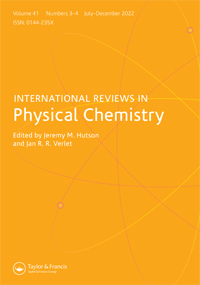解离电子附着和电子驱动的生物过程之间的相互联系
IF 2.5
2区 化学
Q3 CHEMISTRY, PHYSICAL
引用次数: 17
摘要
存在于线粒体中的小分子物种,如醌和氧,可以捕获细胞电子,从而作为电子载体或活性物质,支持呼吸的基本过程,并提供对病原体的保护。当外源药物穿透活细胞时,它们微妙的氧化还原平衡可以通过捕获细胞电子而形成暂时的负离子而被改变。后者可以通过解离电子附着(DEA)引起反应物质的形成,如在气相或电化学条件下观察到的那样。在计算机方法的支持下,在真空中分离生物相关分子的DEA可以作为模型来预测这些物种在脂质-蛋白质-细胞质介质或酶活性中心中电子“泄漏”条件下的体内行为。本文综述了各类化合物的生物活性与DEA形成的片段种之间关系的研究成果。本综述包括以下几类化合物:氯化有机污染物、溴化醚、captol和2,6-二氯异烟酸、atrazine和bromoxynil、非甾体抗炎药、天然多酚类化合物、蒽醛、水杨酸及其相关化合物、抗坏血酸、褪黑素、色氨酸、吲哚及其相关化合物和一些有机过氧化物。利用电子透射光谱(ETS)和DEA光谱对暂时性分子阴离子的形成及其衰变进行了表征。量子化学计算支持解离产物的鉴定。细胞电子附着在非自然电子受体上可能是构成电子驱动生物过程分子机制的级联过程的第一步。DEA检测到的片段种类对于了解外源性药物的代谢,包括药物产生的副作用具有重要意义。本文章由计算机程序翻译,如有差异,请以英文原文为准。
Interconnections between dissociative electron attachment and electron-driven biological processes
Abstract Small molecular species present in mitochondria as, e.g. quinones and oxygen, can capture cellular electrons thus behaving as electron carriers or reactive species, supporting the fundamental process of respiration, and providing protection from pathogens. When xenobiotics penetrate living cells, their delicate redox balance can be altered by capture of cellular electrons to form temporary negative ions. The latter can give rise to the formation of reactive species via dissociative electron attachment (DEA), as observed under gas-phase or electrochemical conditions. DEA to isolated biorelevant molecules studied in vacuo with the support of in silico methods can serve as a model to predict the behaviour of these species in vivo under conditions of electron ‘leakage’ in the lipid-protein-cytosol media or in enzymatic active centres. The present review summarises the results of studies on the correlation between the biological activity of various classes of compounds and fragment species formed by DEA. The following classes of compounds are included into the present review: chlorinated organic pollutants, brominated ethers, captafol and 2,6-dichloroisonicotinic acid, atrazine and bromoxynil, non-steroidal anti-inflammatory drugs, natural polyphenolic compounds, anthralin, salicylic acid and related compounds, ascorbic acid, melatonin, tryptophan, indole and related compounds and some organic peroxides. Formation of temporary molecular anions and their decay are characterised using electron transmission spectroscopy (ETS) and DEA spectroscopy. Quantum-chemical calculations support the identification of the dissociation products. Cellular electron attachment to unnatural electron acceptors is likely to be the first step of cascade processes which constitute the molecular mechanisms of electron-driven biological processes. The fragment species detected with DEA are of importance for understanding the metabolism of xenobiotics, including side effects produced by drugs.
求助全文
通过发布文献求助,成功后即可免费获取论文全文。
去求助
来源期刊
CiteScore
14.20
自引率
1.60%
发文量
5
审稿时长
1 months
期刊介绍:
International Reviews in Physical Chemistry publishes review articles describing frontier research areas in physical chemistry. Internationally renowned scientists describe their own research in the wider context of the field. The articles are of interest not only to specialists but also to those wishing to read general and authoritative accounts of recent developments in physical chemistry, chemical physics and theoretical chemistry. The journal appeals to research workers, lecturers and research students alike.

 求助内容:
求助内容: 应助结果提醒方式:
应助结果提醒方式:


